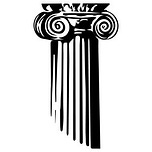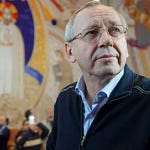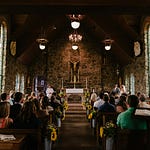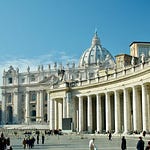JD and Ed address a question that has resurfaced with Pope Francis’ hospitalization— what will happen if there are more than 120 cardinal electors in the next conclave?
Join JD and Ed in Rome this December! Learn more about The Pillar Pilgrimage here.
-
This episode is sponsored by Norman’s Nursery in Southern California. Norman’s Nursery is California’s premier grower of trees, shrubs and houseplants, serving homeowners, landscapers, and developers.
Call (805) 398-0011 to plan your dream landscape today, or visit NormansNursery.com
-
Piano: Wistful by Alexandra Tsikina (CC BY 3.0)


















What happens if a Cardinal reaches their 80th birthday in the middle of a Papal conclave?
Cardinals can vote as long as they're under 80 at the time of the Pope's death/resignation, even if they turn 80 before/during the conclave.
Whenever Benevacantism is discussed, I recall the group that met after Benedict's death to elect a successor. While various candidates (Bishop Gracida, I believe) were discussed, the 'conclave' ultimately decided to elect Jorge Mario Cardinal Bergoglio, and to recognize him by the papal name of Francis.
Silly? In a way, certainly, but also (if you grant their mistaken but sincerely held premise) a wonderful act of love for the church.
I wasn't aware that that happened. Strange.
"Unanimous for Jorge Mario Bergoglio, as successor of St. Peter and successor of Pope Benedict XVI.
The present electorate wants the world to know that they have chosen the only outcome that could be both universally accepted and that is to bring the canonical order of the Church back into harmony with the will of Christ."
https://romalocutaest.com/2023/01/30/bugnolan-conclave-in-surprise-move-elects-bergoglio/
Has any Pope made a statement on how the tension between these two rules — the 120 limit and the non-exclusion clause — ought to be resolved?
It’s not clear to me that we can discern the Pope’s intent from his mere exceeding of the limit with his appointments. Had he wanted to do away with the limit or raise it he could’ve easily done it, but he hasn’t, and that’s also of some value in discerning his intent.
There is one possible way out that doesn’t involve exclusion or exceeding the limit: some cardinals voluntarily abstain from attending.
Honest question. Was the Vatican locked out of the European banking system for the month prior to Benedict XVI's resignation to the extent that even ATMs didn't work, and were the ATMs turned on the day after Benedict's resignation? Maybe somebody in this thread can answer that question.
I don't consider that to be proof that Francis' resignation was invalid, but it does hint that Benedict may have been under pressure to resign, which is something worth reporting on. This is an issue that I've heard several people bring up, but I've never heard anybody who says Benedict's resignation was free of coercion refute or even acknowledge. Ignoring such assertions breeds conspiracy theories. Sunlight is the best disinfectant.
Anyway, I personally act as if Francis is the pope, because I have no idea how to decide the issue and come to an opinion if one side ignores the evidence presented by the other side. Maybe that's the plan? I don't know. I think that people who say they know that Benedict XVI was still pope until his death to be silly due to a lack of solid evidence, but I don't think it is silly to hold two ideas as possible in one's head when people refuse to debate or even offer written refutations of people's assertions.
Relying on the words of someone who is being coerced seems rather silly. It is weak evidence, kind of like believing the words of hostages about their captors. Note that I don't think that Benedict was being coerced, but I personally can't rule it out.
I answered my own question.
https://www.atmmarketplace.com/news/bank-of-italy-shuts-down-vatican-atms-over-aml-issues/
https://www.biography.com/religious-figures/pope-benedict-resignation
https://www.instagram.com/lifesite/reel/DGWnYI3OGGb/
Debanking the Vatican seems like possible coercion to me. Does it prove that Benedict's resignation was invalid? No, because no investigation has been done to shed light on this. However, I'd have to see such an investigation before I made up my mind about the validity of Benedict's resignation, especially given that his own butler said Benedict was being kept in the dark about Vatican finances.
It's actually a really simple solution. Neither you, nor I, nor anyone else - save perhaps the Church's Universal Magisterium, and even that is a contested position - have the authority or duty to pronounce on the validity or invalidity of Pope Benedict's resignation and Pope Francis's election. If one resorts to conspiracy theories because of that, that's an indication of their own hubris moreso than indication of a conspiracy.
So, if political players in the EU or US are pressuring a pope to resign, we are to simply ignore that? When are we allowed to notice that an aged pope is being pressured or has been pressured? Only when the bishops and Cardinals themselves notice? How many have to notice before we can speak about it?
I find the idea of the laity sticking their head in the sand to be a non-starter in a post-McCarrick world. Just because the laity lacks authority to render a verdict in an abuse case doesn't mean we need to remain silent when presented with evidence of abuse. That sort of silent acquiescence by the laity is what led to the abuse getting out of hand and is why McElroy is being installed as bishop in DC. There has been zero accountability for the many bishops who not only covered for McCarrick's predations but actively promoted the man, knowing of his reputation.
I used to have the attitude of trust you suggest. I think the case of George Zirwas broke me. After being convicted of pedophilia and getting out of jail, he moved to Cuba where he lived quite nicely on a Church pension until he was murdered by a prostitute in his Cuban apartment. His live-in boyfriend discovered his body. The Church then flew him back to Pittsburgh, reinstated him posthumously to the priesthood, and not just one but two bishops attended his funeral. Why should anyone trust bishops who act like that?
That doesn't mean I know a solution to this mess. Nor do I believe that I have the authority to render a verdict here: clearly I lack both authority and information to render a verdict. I just don't believe silence and ignoring evil is better in the end: we should be able to discuss possibilities and probabilities when presented with evidence, while keeping in mind the limits of our authority. To say otherwise is to promote a servile attitude among the laity undermines the gospel.
Woah woah... To me, it's not a laity vs. clergy thing. I include myself among those who have no authority to render that sort of judgment. I'd recommend reading Sigrid Undset's biography of St. Catherine of Siena, which inevitably includes details about the Western Schism. That schism literally started because Cardinals cast doubt upon the validity of a Pope's election, and it led to great scandal. And history remembers them as schismatics, not the Pope of Rome. Christ didn't leave us with a code to crack--the Church is the Church and the Pope is the Pope, regardless of circumstances.
I am with Ed: there is no point in trying to get a financial guarantee out of anybody in the Vatican at this point.
If you need anything financial out of the Vatican (right now), I would require cash up front.
The Pillar’s most controversial take is that 120 people can have a “manageable” group chat.
This is not the first podcast episode that has made me ask myself: What are we really talking about when we speak of due process or rule of law in the Church? Isn't due process a function of separation of powers? It sure sounds like, at least insofar as we're discussing ecclesiastical law, we have ourselves a strictly arbitrary (=arbitrium) system of power.
At the level of the Roman pontiff, the rule of law is an act of self-restraint, it seems to me.
I think due process is a human right that can exist outside of separated powers, but only as an act of the will on the part of the sovereign.
Thanks, I appreciate the answer. I guess I still wonder, is that what people mean when they use the term rule of law? I tend to interpret that phrase to mean that the law is what governs. "A government of laws, not of men." (No doubt, people can poke holes in that concept, but since that's what we're talking about, that's what I think it means.) If we're only talking about self-restraint in observance of customary or self-imposed but non-binding rules, then I don't think it's the same thing.
Moreover, if whenever the Roman pontiff does something, it's ipso facto legal, then no self-restraint is necessary—it would be impossible for him to be on the wrong side of the law! Same deal with due process. ("You didn't follow the process!" —"But by not following the process, I created a new process.")
Our Lady Help of the Sick, pray for the Holy Father Francis 🙏 🙏 🙏
Can you guys recommend - for an amateur with a 12th grade Franciscan/OFM religious education and parish adult catechesis for ~ 25 years - a ~ seminal, ~ single volume Catholic History prior to the French Revolution?
I just finished Professor John T. McGreevy’s “Catholicism: A Global History from the French Revolution to Pope Francis. So my “church history learning gap is between Fr. Raymond E. Brown SS + ‘s “The Community of the Beloved Disciple” and Professor McGreevy’s very sound and well-balanced 2022 history. Thank you!
Cardinal Albert Vanhoye SJ was not a bishop when named a Cardinal. Academician like Avery Cardinal Dulles SJ.